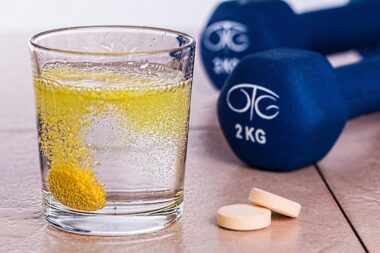The Importance of Vitamins for Athletes: Boosting Performance and Recovery
Vitamins and minerals play a vital role in the overall health and performance of athletes. They serve numerous functions that help boost energy levels, improve recovery times, and enhance bodily functions. Vitamins are essential for metabolic processes and cellular function, affecting how the body utilizes energy for intense physical tasks. Athletes often require higher levels of these nutrients compared to sedentary individuals to replace those lost during rigorous training and competition. Special attention should be placed on water-soluble vitamins such as B-complex, which support energy production and red blood cell formation. Additionally, fat-soluble vitamins like A, D, E, and K are crucial for immune function, bone health, and oxidative stress recovery. An optimal balance of these vitamins not only benefits physical efficiency but also contributes to mental clarity and focus. Adequate intake often requires dietary supplements, especially for athletes under high training volumes. So, a tailored supplementation plan can significantly enhance performance and recovery. Athletes should consult a nutritionist to set personalized requirements to support their training goals effectively and to maximize their potential on the field.
Key Vitamins for Athletic Performance
Several key vitamins are particularly significant for athletic performance and recovery. Vitamin C is one of the most important, known for its role in immune support and collagen synthesis, essential for tendon and ligament health. Vitamin D is crucial for bone health, enhancing calcium absorption and maintaining muscle function. Adequate levels can prevent injuries and promote strength during challenging workouts. B vitamins, including B1, B2, B6, and B12, are vital for converting carbohydrates into usable energy, supporting endurance levels. Their deficiency can lead to fatigue and decreased performance, making supplementation highly beneficial. Folate, another B vitamin, is beneficial for red blood cell production, while niacin aids in energy metabolism. Other vitamins, like vitamin E, act as antioxidants that help reduce muscle damage and inflammation after competitive efforts. This helps athletes recover more swiftly post-exercise. Including a variety of fruits and vegetables in your diet can ensure adequate vitamin intake while also promoting overall well-being. In this way, athletes can not only meet their performance benchmarks but also minimize the risk of injury and promote longevity in their sports careers.
A deficiency in essential vitamins can have serious consequences for athletes. Poor performance is often the first noticeable effect, but the long-term implications can be more severe, including chronic illness or decreased bone density. For instance, a lack of vitamin D leads to weaker bones, increasing the risk of fractures, particularly in sports that demand high-impact movements. Vitamin C deficiency can lead to prolonged recovery times and heightened susceptibility to illness during high training loads. Symptoms of deficiency include fatigue, poor recovery, and increased susceptibility to injuries. Furthermore, hormonal imbalances can arise from insufficient vitamin levels, affecting overall energy and mood. Fatigue and irritability may ensue, impacting an athlete’s motivation and mindset. On the contrary, achieving adequate levels of these vitamins boosts performance as athletes often see significant improvements in endurance, strength, and overall recovery. Hence, maintaining a balanced diet enriched with essential vitamins is an athlete’s foundation for achieving peak performance. Supplementation can fill gaps when dietary sources are insufficient, especially during periods of intense training. An informed approach to nutrition ensures that athletes can perform at their best and recover efficiently.
Supplementation Strategies for Athletes
For athletes looking to enhance their performance and recovery, effective supplementation strategies are essential. First, proper assessment of dietary habits is crucial to identify potential gaps in vitamin intake. Working with a sports nutritionist can help in creating a tailored supplementation plan that fits individual needs. Many athletes might benefit from multivitamin supplements to cover an array of essential nutrients. Additionally, specific vitamins such as B-complex or vitamin D can be taken separately if a deficiency is identified. Timing of supplementation matters as well; consuming vitamins around workout times maximizes their effectiveness. For example, vitamin C can be taken post-exercise to help with recovery and minimize muscle soreness. Another strategy is pairing vitamins with nutrient-dense foods to improve absorption, such as taking fat-soluble vitamins with healthy fats. Maintaining hydration is also key as it aids vitamin absorption, particularly for water-soluble vitamins. Athletes should document their energy levels, recovery status, and any changes in performance to assess the efficacy of their supplement regime. Ultimately, a structured and informed approach to supplementation can dramatically enhance athletic performance.
It is essential for athletes to balance their vitamin intake with an overall healthy diet. Whole foods should always form the foundation of nutritional practices. Foods rich in vitamins include fruits, vegetables, whole grains, dairy products, and lean proteins. A colorful plate often indicates a wide range of vitamins and minerals present in the meal. For instance, leafy greens and citrus fruits are excellent sources of vitamins A and C, while fatty fish are vital for vitamin D and omega-3 fatty acids. Consuming a variety of foods will provide not only vitamins but also essential minerals such as calcium and magnesium, which further enhance performance. Preparing meals ahead of time ensures that athletes can make healthier choices, avoiding quick, less nutritious snacks. Therefore, meal planning is an effective way to maintain balance and prevent nutrient deficiencies. Additionally, frequent monitoring through medical check-ups can catch any deficiencies early and adjust dietary or supplementation plans accordingly. This approach builds a more resilient athlete capable of performing at peak levels without compromising health, underscoring the fact that nutrition is a cornerstone of athletic success.
Conclusion: Maximizing Athletic Performance
In conclusion, vitamins and minerals are foundational to athletic health, performance, and recovery. Athletes need to prioritize balanced nutrition to sustain their training demands while minimizing injury risks. Adequate vitamin intake aids energy production, immune function, and recovery processes. Employing targeted supplementation can help athletes achieve the required levels of these nutrients, particularly during heavy training cycles where dietary intake might fall short. Moreover, an informed approach incorporating meal planning, timing, and hydration ensures maximization of performances on the field. Consulting with experts in sports nutrition provides tailored insights that empower athletes toward reaching their goals. Ensuring dynamic dietary habits alongside proper supplementation strategies sets the stage for athletic success. Learning to listen to the body’s signals for nutrient needs and adjusting accordingly is imperative. Ultimately, embracing a holistic approach that marries training with solid nutritional practices will lead athletes to renewed energy, improved physical resilience, and longer-lasting careers. As they strive for excellence, understanding and respecting the importance of vitamins in their regimen will undoubtedly play a crucial role in their success.
To optimize overall performance, athletes need to learn the best sources of vitamins and how to integrate them into their diets effectively. Targeting nutrient-dense foods with a wide array of vitamins is key, as is staying informed about the latest nutrition science. Furthermore, athletes should also be cautious of overconsumption of vitamins, which may lead to toxicity and health concerns. Establishing an equilibrium between dietary intake and supplementation not only protects against deficiencies but also prevents the adverse effects of excessive supplementation. Planning meals around training schedules can help in maximizing nutrient intake, allowing for better recovery and sustained energy levels. Finally, embracing the journey of nutritional optimization speaks to an athlete’s commitment to their craft and overall well-being. It sets them apart not just in performance but also in holistic health. Continuous education about nutrition is essential, as is a willingness to adapt and change as athletic demands evolve. As athletes pursue their goals, recognizing the critical role vitamins and other nutrients play in sustaining energy and enhancing recovery will propel them toward achieving new heights.
In summary, vitamins are not merely supplemental but foundational aspects of an athlete’s journey towards optimal health and performance. Their roles in enhancing energy, recovery, and overall body functions cannot be overstated. A focused approach, which includes both nutrient-dense food sources and effective supplementation strategies, empowers athletes to perform their best while maintaining long-term health. The use of pressurized training and calorie deficits can complicate vitamin intake; thus, being deliberate about nutrition is of utmost importance. Investing in proper nutrition can yield significant benefits, paving the way for both excellence in sports and personal health. Education on nutritional needs is crucial, guiding athletes in making informed decisions for their diets and supplement usage. It is equally important for athletes to monitor their health regularly through professional advice, further fine-tuning their approaches for optimal results. Achieving balance is crucial to avoid deficiencies or excesses that could hinder performance or health. Ultimately, a robust nutritional foundation paired with dedication and training can unlock remarkable potential and endurance in athletes, ensuring longevity and success in their competitive careers.





